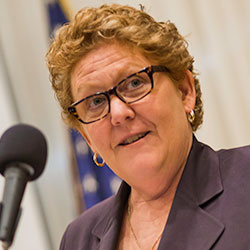U.S. Presidential Election 2020: A Post-Mortem of Pandemic Proportions
View the on-demand recording of this November 18 webinar discussion on key Election 2020 takeaways that will impact the future of the United States and the future of elections.
Like so many other aspects of the year 2020, the U.S. presidential election has seen unprecedented experiences. On November 7, 2020, four days after election day, many news outlets projected a new president-elect. During the coming days and weeks ballots will continue to be counted and recounted and court cases will consider the validity of the election outcomes. While election results are confirmed, discussions are beginning and ongoing to explore what happened.
In this recorded webinar, Vincent Hutchings, political science and Afroamerican and African studies professor at University of Michigan, and Julia Azari, political science professor at Marquette University, discuss key takeaways that will impact the future of the United States and the future of elections. Watch the recording to explore:
- The various forms of voting due to the pandemic.
- The diversity of the electorate.
- Differences between 2016 and 2020
- The nature and future of party polarization
U.S. Presidential Election 2020: A Post-Mortem of Pandemic Proportions
About the Speakers:
 Vincent Hutchings is a political science and Afroamerican and African studies professor at University of Michigan. His general interests include public opinion, elections, voting behavior, and African American politics. He recently published a book at Princeton University Press entitled Public Opinion and Democratic Accountability: How Citizens Learn About Politics, that focuses on how, and under what circumstances, citizens monitor (and consequently influence) their elected representative’s voting behavior. In addition to this project, Professor Hutchings also studies how the size of the African American constituency in congressional districts can influence legislative responsiveness to Black interests. The most recent product of this research was published in the Journal of Politics.
Vincent Hutchings is a political science and Afroamerican and African studies professor at University of Michigan. His general interests include public opinion, elections, voting behavior, and African American politics. He recently published a book at Princeton University Press entitled Public Opinion and Democratic Accountability: How Citizens Learn About Politics, that focuses on how, and under what circumstances, citizens monitor (and consequently influence) their elected representative’s voting behavior. In addition to this project, Professor Hutchings also studies how the size of the African American constituency in congressional districts can influence legislative responsiveness to Black interests. The most recent product of this research was published in the Journal of Politics.
 Julia Azari, an associate professor of political science at Marquette University, is also the Faculty Director for the Inauguration 2021 Academic Seminar. Her research and teaching interests include the American presidency, American political parties, the politics of the American state, and qualitative research methods. Professor Azari is author of the book, Delivering the People’s Message: The Changing Politics of the Presidential Mandate. She is a regular contributor to the political science blog, Mischiefs of Faction, a contributor at FiveThirtyEight.com, and a co-host of the political science podcast Politics in Question. She holds Ph.D., M.A. and Master of Philosophy degrees in political science from Yale University, and a B.A. in political science from the University of Illinois at Urbana-Champaign.
Julia Azari, an associate professor of political science at Marquette University, is also the Faculty Director for the Inauguration 2021 Academic Seminar. Her research and teaching interests include the American presidency, American political parties, the politics of the American state, and qualitative research methods. Professor Azari is author of the book, Delivering the People’s Message: The Changing Politics of the Presidential Mandate. She is a regular contributor to the political science blog, Mischiefs of Faction, a contributor at FiveThirtyEight.com, and a co-host of the political science podcast Politics in Question. She holds Ph.D., M.A. and Master of Philosophy degrees in political science from Yale University, and a B.A. in political science from the University of Illinois at Urbana-Champaign.
About the Moderator:

Kelly Eaton is senior vice president and chief academic officer with The Washington Center. Prior to joining TWC eight years ago, Kelly served as a Professor and Department Chair of Political Science with Nebraska Wesleyan University. She holds a PhD in Political Science and Government from George Washington University.
The Washington Center (TWC) is a non-partisan, educational organization that strives to expose audiences to the wide array of perspectives and opinions on current and political issues. The views expressed by interview subjects, speakers and panelists do not necessarily represent TWC’s views.
